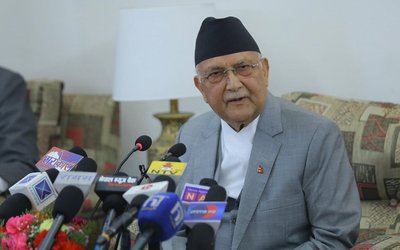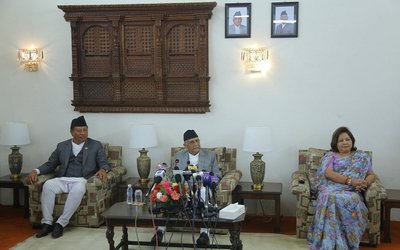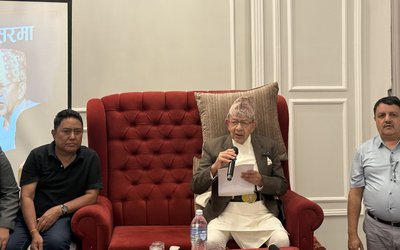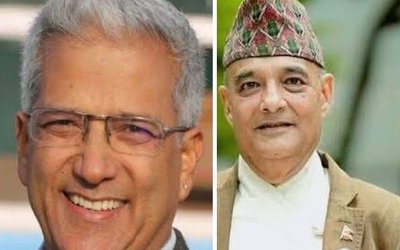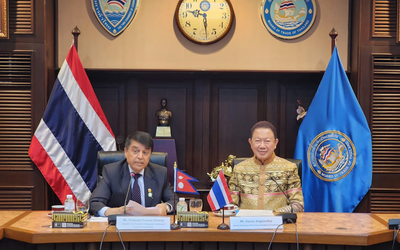
Secretary at the Ministry of Federal Affairs and Local Development Dr. SOM LALA SUBEDI did his Ph.D in fiscal decentralization. As Nepal is launching a national reconstruction campaign, Dr. Subedi spoke to NEW SPOTLIGHT on various issues regarding the role of local bodies in reconstruction. Excerpts:
How do you see the role of local bodies in the post-disaster situation?
We need to start from design and deficit at the local level governance. This is very important. We have shown reluctance to localize service delivery, service, resource and capacity. The present state of disarray in local bodies is the result of that reluctance. We are unable to deliver as much as we can because of bureaucratic mechanisms. Although we have mobilized over 1.2 billion people at the local level through Ward Citizen Forum, which is a different matter, especially in demand and strengthening side. But there is no institution to automatically encourage, inform and empower, train and suggest ways for individuals, including in the construction of safe house.
Do you think local bodies can carry out the work effectively as elected bodies?
We cannot do it in the present context with centralized mindset and centralized structure and behavior. We are unable to work effectively in the post-disaster scenario without elected representatives. If the existing scenario continues, there will be a lot of gap in future. I say this is a deficit.
How do you explain the deficit?
I identify nine deficits, including political and democratic deficit at the local level. Had there been the local elections, locally elected representatives would have taken all the responsibility of reconstruction by mobilizing beneficiaries, local resources and other aspects. Then, our role would have just been that of a facilitator. However, in the absence of local bodies, our small institution has to do everything. Local bodies are the foundation of the political system. If the country’s foundation is strong, it will bring a lot of change. Recent earthquake has already shown that the center will be stronger in case of strong foundation. If the local bodies do have democratic exercise, it will support the political system by filtering the leadership, sending completive leaders at the center.
How have elected local bodies affected the process?
As we did not hold the elections for local body’s for a long time, there are many issues related to continuation of service and improving the service delivery. Competitive service and local economic development also got stalled due to lack of creative activities.
How do you see the capacity of local bodies?
Capacity and bureaucratic deficit is another factor. Capacity is related to society. It involves change and new context. The climate change, geological, seismological and soil testing and technology are available in the society. Bureaucratic deficit involves lack of manpower. Along with scarcity of manpower, there is also lack of capacity. As per the Local Self Governance Act, there is a provision that all the district level institutions should support local bodies to enhance their capacity. Due to this, there remains a deficit.
How about the design and coordination?
Design and coordination is another important component. Since we still hold centralized mindset, there are tendencies to carry out the work by themselves instead to playing a role of facilitator. Thus, there are many problems in design and coordination. It exists even in the normal situation.
How important is the delivery system?
In the absence of localization of delivery system, there appear to be a lot of problems. Local bodies are unable to provide the service as per the need of the people.
Do you see any governance deficit?
The fifth is the governance deficit. I think that now our local bodies are more agent focused than the client. We have spent more time on agent because they have more influence. Although there are some positive aspects of the system, we are unable to provide service delivery and resources at the hand of people. We are unable to make progress on governance deficit. Listen to the people and provide resources at the hand of people.
How important is fiscal federalism?
Another major deficit is in fiscal federalism. Because of this, local bodies are working in unfunded and underfunded areas. Since there is a lack of resources, local bodies are unable to fulfill the wishes of the people. Even within the unitary system, there exists a fiscal federalism. Due to this, we are unable to timely allocate resources and enhancing capacity and provide service delivery in a competitive way.
How do you see the social ethics and values?
Social ethics and values are important. Due to cultural variables, the 'I factor' is more visible than 'We'. There is a lack of collective governance and corporate response. There is a gap. There is the need to go for social harmonization.
What is the capacity of disaster preparedness?
The last not the least is related to disaster preparedness. There is a big gap on it. Due to lack of resources, institutions and information, we are unable to prepare for disaster. There is a big deficit of disaster preparedness.
How do you see the deficit in accountability?
Finally, there is a deficit of accountability. Who is responsible for what is more important. We are yet to strengthen the part of accountability in all our service delivery system. It involves benefits and burdens. It also involves bonding the government service. There is also the concept of bringing the government closer to the people. We need to localize the accountability on the basis of bringing the government closer to the people. We are yet to make our local bodies accountable to clients, there is no larger degree of autonomy thus it affects the issue of accountability. Our institution is like a mechanical tool rather than human due to lack of larger accountability. Our institutions are ye to work for innovation.
Your ministry has taken several decisions recently after the earthquake, where do you fit them?
Following the earthquake, we have mobilized our local bodies by providing the resources from various titles. We issued directives to all DDCs to work with District Disaster Relief Committee to provide relief to the people. We directed them to work on need base. We have mobilized resources in 14 districts with the consent from donors of 500 million rupees to distribute through VDCs and Municipalities. That was the first money that went to the hand of people. This is the first time grassroots level institutions received the money. Even after this we directed local bodies to use the available other resources for relief operation. We even directed local bodies to revisit their planning process. As we have already forwarded this proposal to Ministry of Finance, we will send it to the local bodies once the Ministry of Finance gives its consent.
How about the importance of building code?
So far as implementing the building code is concerned, it is the Ministry of Urban Development to lead the technical side. Our local bodies can execute it with the coordination of Ministry of Urban Development. Our aim is to disseminate the information about the importance of building code to make their house safe and secure. We have withheld the construction for two months and we will develop it by then. We will bring the new building code. This is not a work of a single ministry as we need to have coordination among all the ministries to implement the building code effectively. There is the need to have unity among all the sectors in the society, including political, bureaucratic and social and civil society. Building code can be implemented if all the concerned stakeholders work together. Only after its implementation, we will be able to make the city safer and resilient to earthquake.
What role are the local bodies playing in the context of dismantling the illegal houses and managing the debris?
So far as dismantling the unauthorized buildings and managing the debris are concerned, local bodies alone cannot do it. Our ministry provides 8 percent of annual budget to VDCs and DDCs and just above 2 percent to Municipalities. At a time when there is a question about the availability of technology at the center, we can easily assume the technology is at local bodies. But we don’t have enough machinery and technology as well as budget at local level to handle the present situation. With the leadership of District Disaster Relief Committee, municipalities and other bodies are working to clear the debris and dismantle the unauthorized buildings. Even the central level committee is now talking about the need to carry out this. We had not visualized the present scenario. We failed to project this situation. We failed to see it.
Who do you blame for the haphazard urbanization?
Had there been local elections, there would have been a different situation. It is the political power to mobilize the people and bureaucracy alone cannot do it. It is a trust deficit to say that bureaucracy can mobilise the people. We need politicians to mobilise the people. Had we have elected representatives, the situation would have been much different as they are accountable to the people.
- IME GROUP: Expands Into Paper Industry
- Mar 24, 2025
- CPN UML: Instigated By India
- Mar 23, 2025
- ADB’S CHIEF ECONOMIST: Nepal Reduces Poverty
- Mar 11, 2025
- FM DR. DEUBA: A Successful Visit
- Mar 11, 2025
- MD GHISING: Target Of Personal Grudge
- Mar 09, 2025






